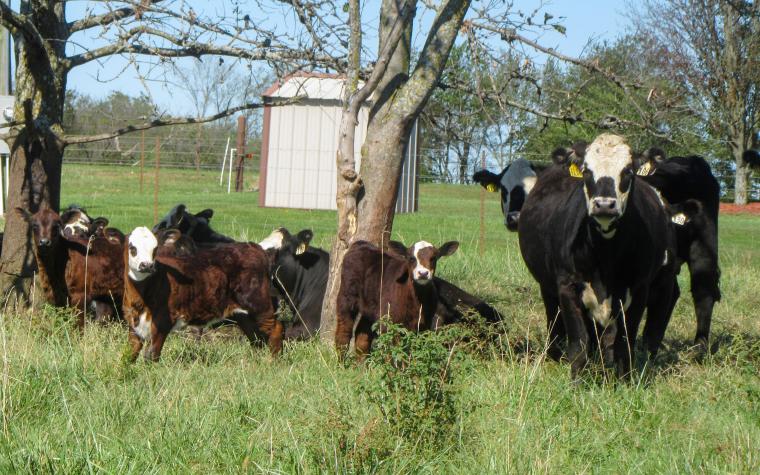STOCKTON, Mo. – “Cattle prices are good right now, which provides income to invest in the next set of females to rebuild or grow the cattle operation,” says Patrick Davis, University of Missouri Extension livestock field specialist. One way to do this is by buying bred replacement heifers. However, it is important that cattle producers ask the right questions so that those purchased heifers are successful in their cattle operation. Davis will discuss things to consider when buying bred replacement heifers.
“Consider nutritional management and energy status when buying bred replacement heifers,” says Davis. Body condition score (BCS), which evaluates animal condition or fat cover on a 1 to 9 scale, is the best way to evaluate nutritional management and energy status. At the time of purchase and prior to calving, heifers should be in a BCS of 6, which is a smooth appearance throughout. For more information on heifer BCS refer to MU Extension guide G2230.
“Any bred heifer that you purchase should have met a minimum pelvic area measurement during their pre-breeding exam,” says Davis. The pelvic area measurement (PA, width X height) helps to make sure the heifer is large enough to have a calf with ease. Based on Missouri Show-Me-Select (SMS) Replacement Heifer Program requirements, heifers need to measure a PA of at least 150 cm2 at pre-breeding. Heifers with smaller PA can be remeasured at pregnancy check within 90 days of the start of the breeding season but must measure 180 cm2 at this time. If heifers fail both measurements, they should be culled and not sold as bred replacement heifers because of the chance that they will not calve with ease. For more information when considering bred replacement heifers for purchase, look at MU Extension guide G2028.
“Consider buying bred heifers that are genomically tested,” says Davis. Furthermore, buy heifers that are either bred through artificial insemination or natural service to sires that are genomically tested, have high-accuracy acceptable expect progeny difference numbers for calving ease direct, and other economically important traits for your cattle operation. Considering these strategies in addition to buying females that are structurally sound should lead to females that will produce calves in your operation for a long time that meet the needs of your operation, leading to optimum profitability.
“Bred heifers should have been pregnancy-checked within 90 days after the beginning of the breeding season as well as within 30 days prior to sale,” says Davis. Evaluating heifers at 90 days or less pregnant gives a better estimation of the calving date. In addition, the heifer needs to be evaluated prior to sale to make sure she did not abort her calf.
“Finally, it is important that heifers have followed a proper vaccination and parasite control program during the development process,” says Davis. Work with your veterinarian to develop a proper vaccination and parasite control program for your cow herd, and use that when evaluating the program for your purchased heifers. Furthermore, you may want to keep the purchased heifers away from the regular cow herd for approximately 30 days to make sure the purchased heifers don’t bring a sickness problem into the cow herd. For more information on a framework for a cow herd vaccination program, go to MU Extension guide G2104.
“All the things mentioned above are part of the SMS program, which has been a reliable source of bred replacement heifers for over 25 years,” says Davis.
When buying your replacement heifers, consider the 57th Southwest Missouri SMS Replacement Heifer Program bred heifer sale, 7 p.m. Friday, May 16,,at Joplin Regional Stockyards, 10131 Cimarron Road, Carthage. The sale offering will be 119 bred replacement heifers calving from August to Nov. 30. Breeds involved in making up the heifers include Angus, Gelbvieh, Red Angus, Hereford, Simmental, Beefmaster and composites of these breeds.
For more information on the heifers in the sale, contact Davis at 417-276-3313 or davismp@missouri.edu, Andy McCorkill at 417-345-7551 or mccorkilla@missouri.edu, or Ian McGregor at 417-466-3102 or ian.mcgregor@missouri.edu.
The sale will be broadcast online via DVAuction and there is an opportunity for online bidding through this platform. Contact Joplin Regional Stockyards at 417-548-2333 to set up online bidding.
For more information on the Show-Me-Select Replacement Heifer Program, go to http://muext.us/sms.
